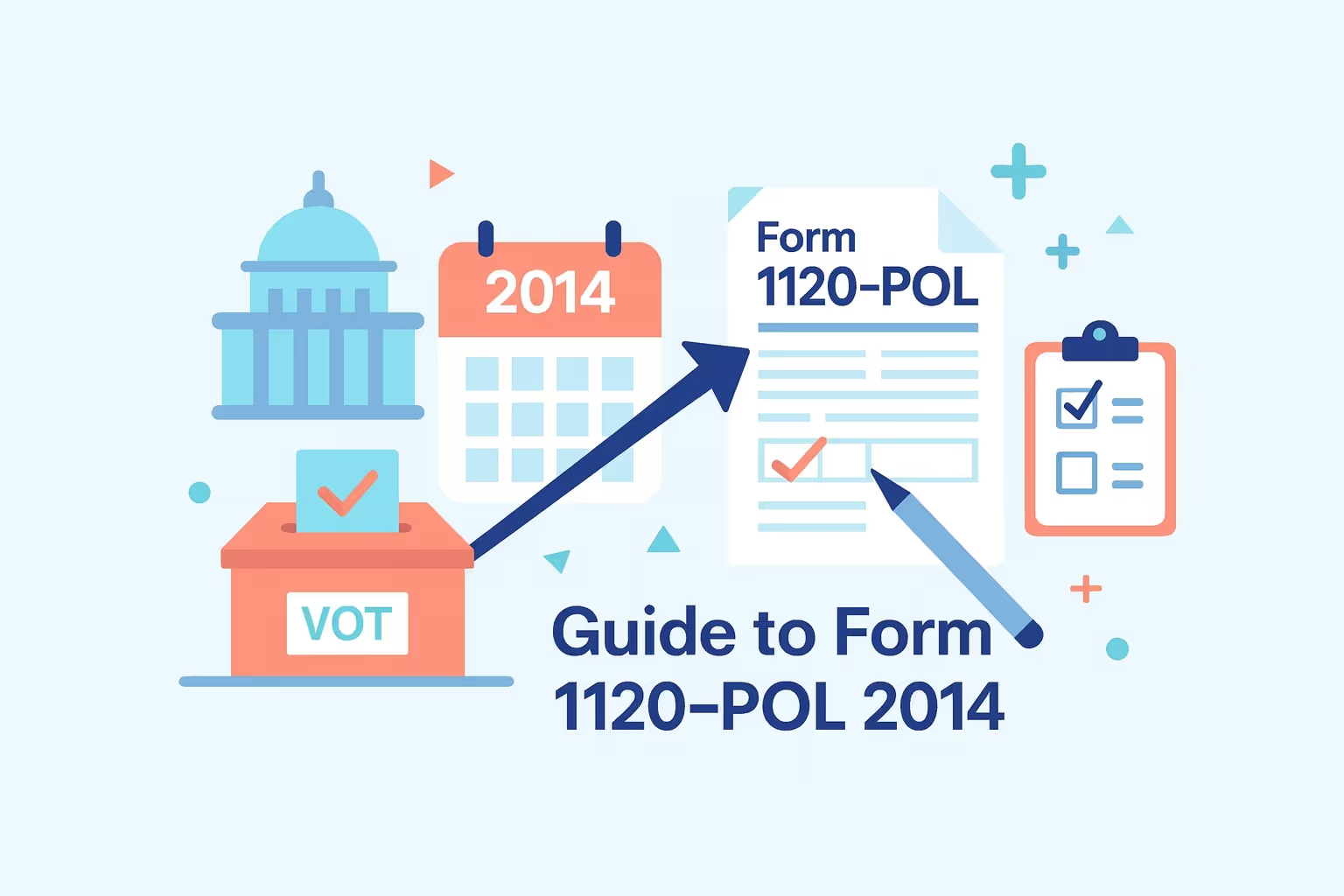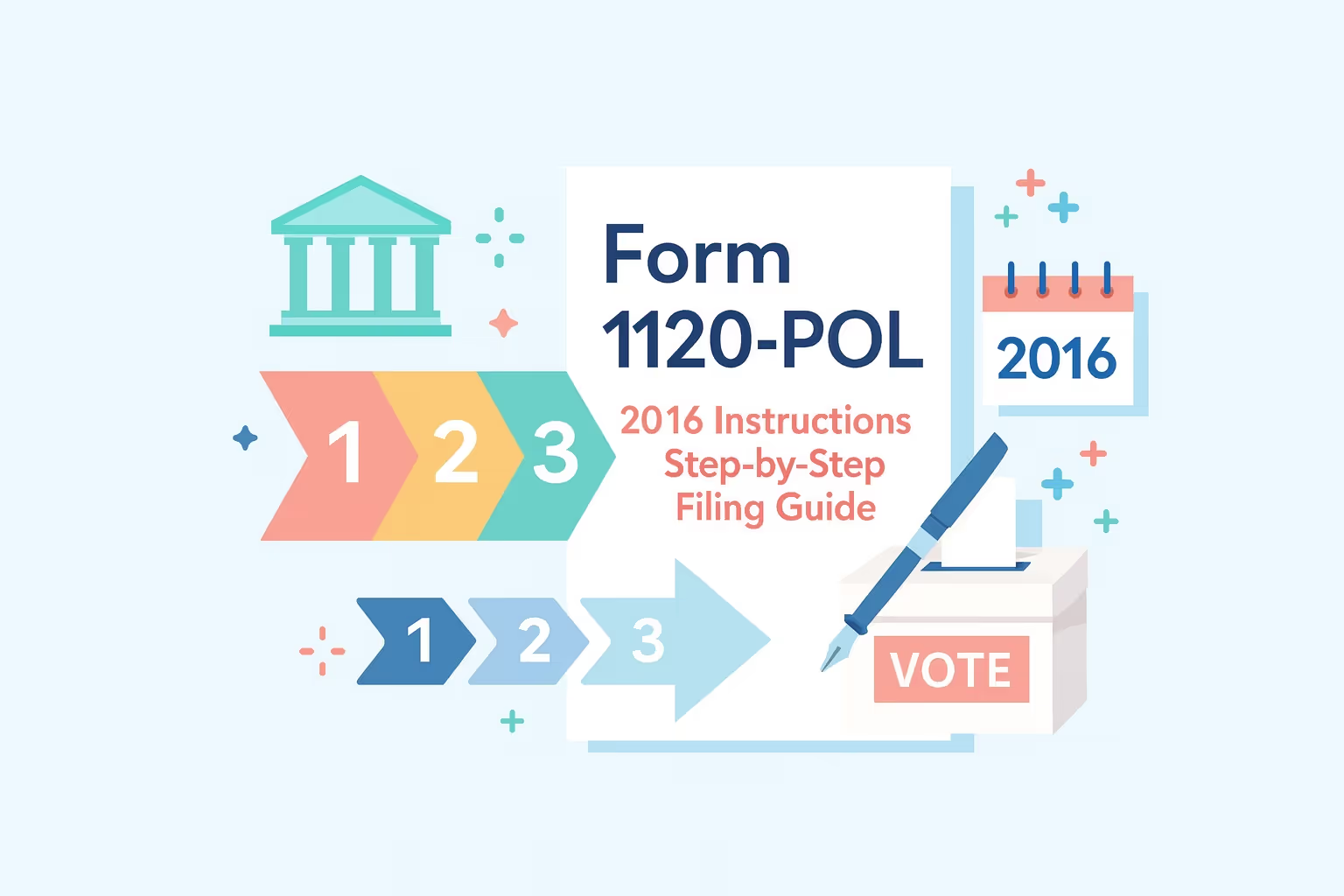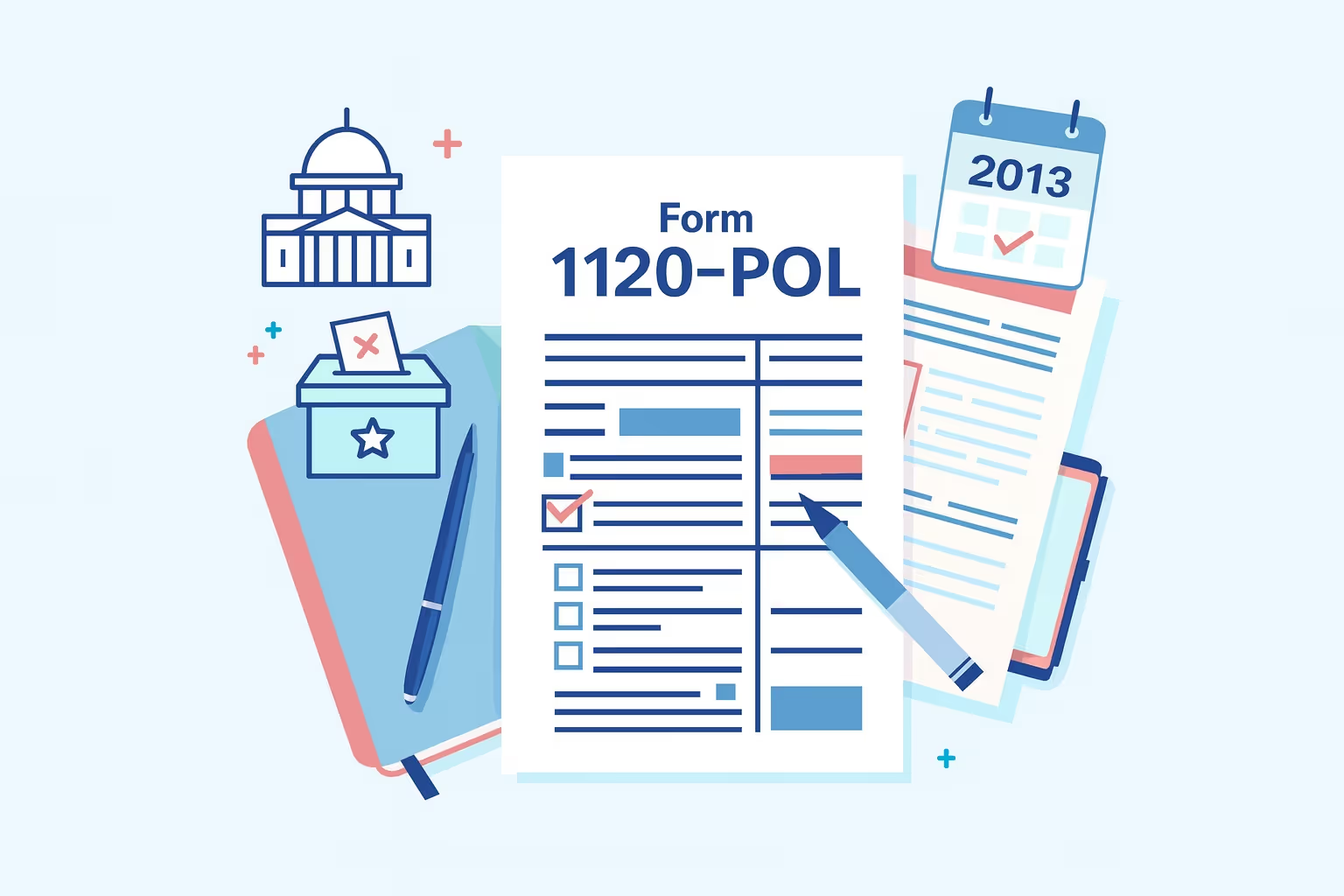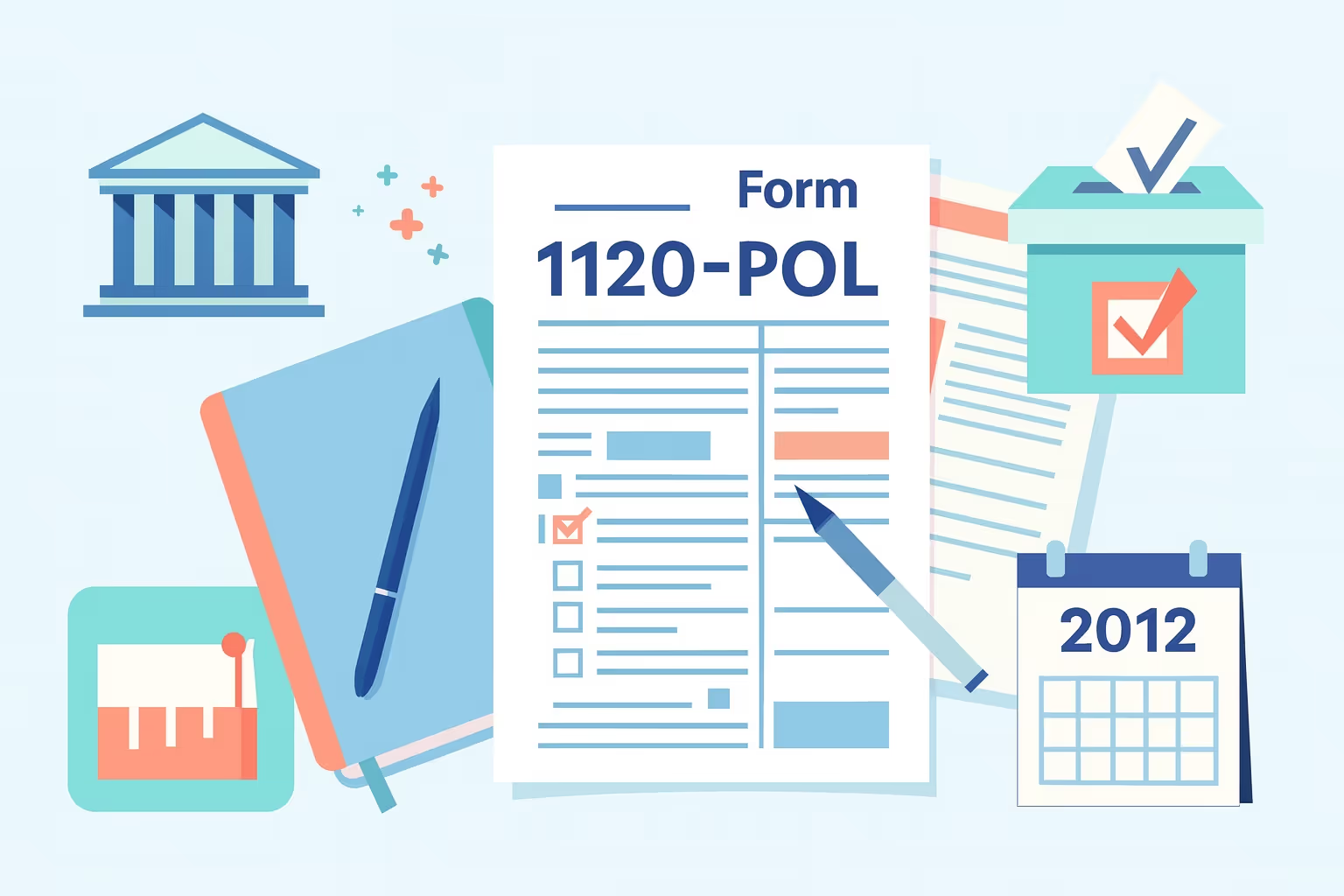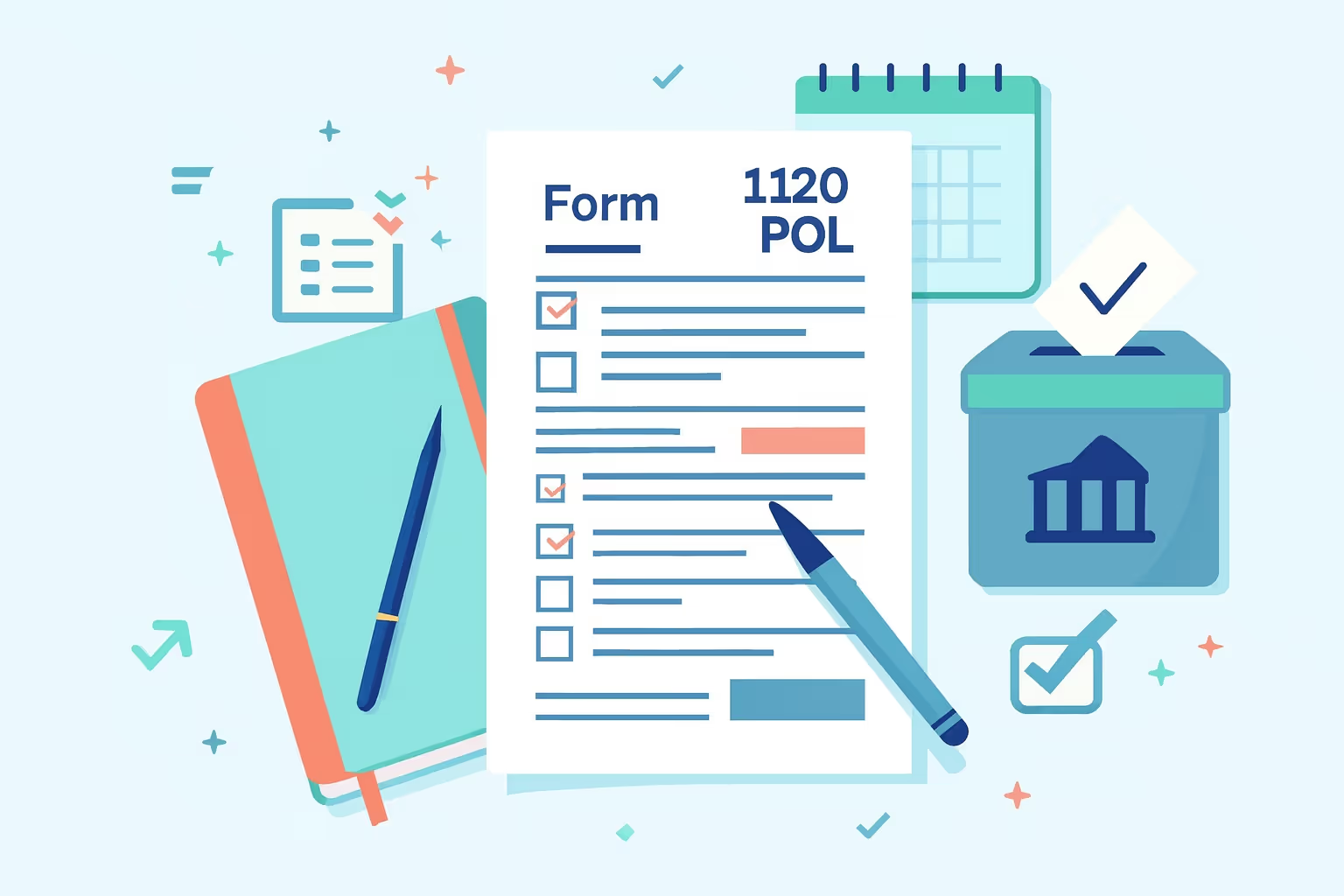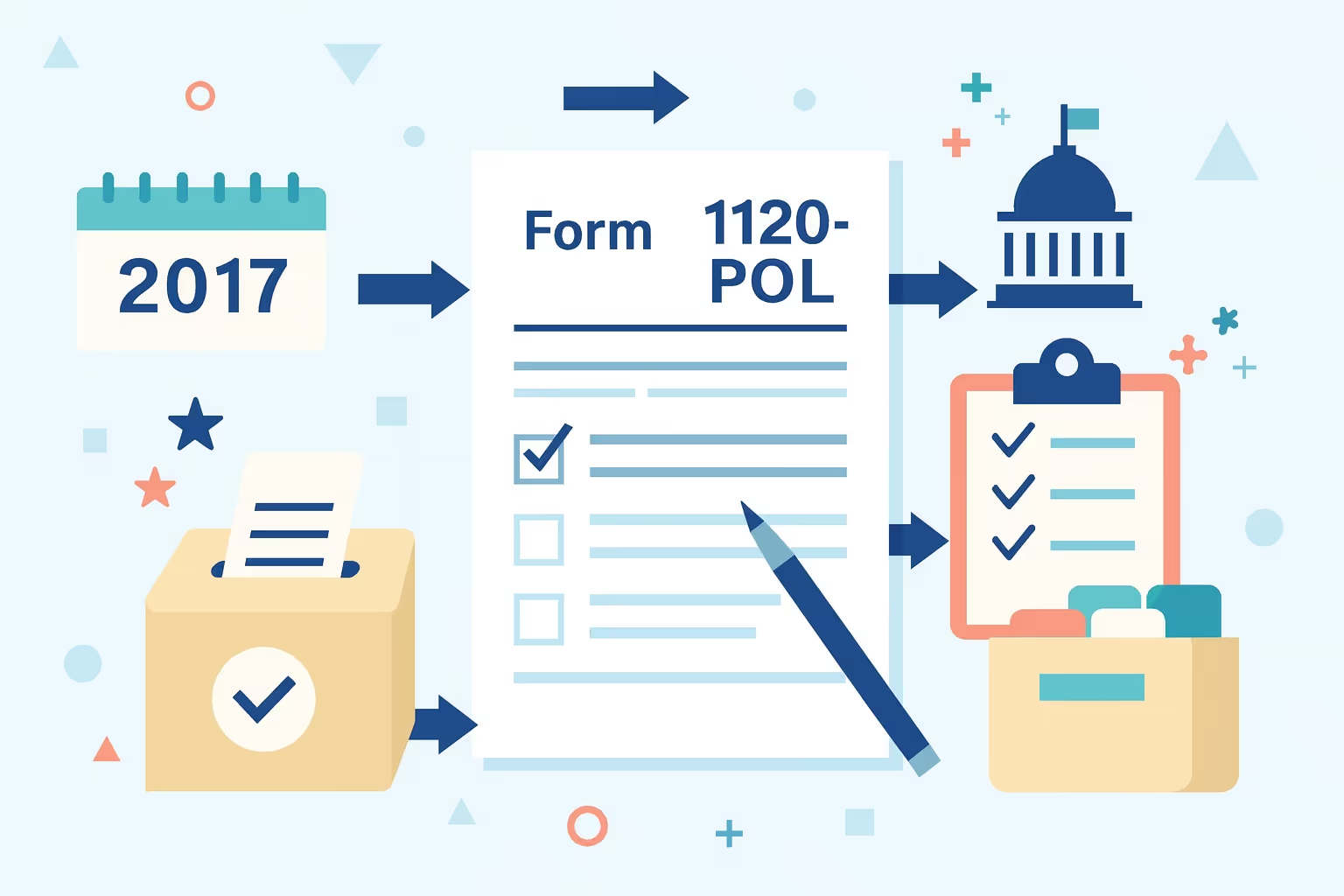
Filing an income tax return can be challenging for political organizations that generate taxable income outside their exempt functions. Under the Internal Revenue Code, certain political organizations must file Form 1120-POL to report this income to the Internal Revenue Service. For the 2017 tax year, the form’s instructions provide detailed guidance that organizations must follow carefully.
Political organizations, including principal campaign committees, segregated funds, and newsletter funds, may be required to file even if they are tax-exempt organizations. An annual return filed with the IRS helps confirm compliance, ensures that deductions and expenditures are properly recorded, and establishes that taxable income has been reported. Missing a filing can lead to penalties and interest.
This guide explains who must file, what information to include, and how the Internal Revenue Service sets the due date for submission. It also covers short-period return rules, applicable forms, and the role of information returns. Following these instructions ensures that organizations meet compliance obligations during the tax season and protect their tax-exempt status.
Overview of Form 1120-POL 2017 Instructions
Form 1120-POL is the income tax return designed for certain political organizations. It documents taxable income earned outside exempt functions, details deductions, and calculates the income tax owed. The Internal Revenue Service requires this submission to ensure compliance with federal law and provide a clear financial activity report during the taxable year.
What Is Form 1120-POL?
- Purpose of the form: Form 1120-POL reports taxable income for political organizations and calculates the taxes due.
- IRS oversight: The Internal Revenue Service requires this form to confirm compliance with the Internal Revenue Code.
- Function of reporting: The form records income, expenditures, deductions, and gains, ensuring that every organization’s tax return is accurate.
Which Political Organizations Must File Form 1120-POL?
- Campaign committees: Principal campaign committees for congressional candidates must file when taxable income exists.
- Segregated funds: Separate funds established by exempt organizations must file if political activities create taxable income.
- Other organizations: Newsletter funds and similar entities are also considered political organizations and must submit a return.
Taxable Income Thresholds and Filing Rules
Any organization with taxable income must file Form 1120-POL, regardless of activity level. A $100 specific deduction is allowed, but amounts beyond that create filing obligations. The form’s instructions clarify that even organizations with minimal gross receipts must submit an annual return filed with the IRS once income is present. Compliance is mandatory under the Internal Revenue Code.
Applicability for Certain Political Organizations and Exempt Groups
The IRS applies filing requirements to political and tax-exempt organizations engaged in political activities. The applicability date of these requirements depends on the organization’s accounting period. Filing ensures that taxable income, deductions, and expenditures are reported accurately per IRS rules for annual and certain returns filed electronically.
Political Organizations Under the Internal Revenue Code
- Section 527 groups: These political organizations are formed to influence elections and must file if they generate taxable income.
- Exempt function distinction: Contributions used solely for exempt political purposes are not taxable, but investment income is.
- IRS compliance: The Internal Revenue Service reviews figures, schedules, and documents for accuracy using the filed form.
Exempt and Tax-Exempt Organizations with Political Activities
- Exempt organization obligations: Even an organization exempt from corporate taxes may be required to file Form 1120-POL if political activities generate taxable income.
- Deductions and gains: Filing ensures that deductions, sales, and profits are reported correctly to the Internal Revenue Service.
- Maintaining tax-exempt status: Compliance with reporting requirements helps protect an organization’s exempt designation under the Internal Revenue Code.
Annual Return Filing and Accounting Period Considerations
Organizations must consider when their accounting period ends. A calendar-year filer must submit by April 15, while other corporations follow the due date set by the fourth month after their period closes. A short-period return may be required when the accounting year changes or operations begin midyear.
Key Dates, Due Date, and Filing Deadlines
The Internal Revenue Service establishes clear deadlines for filing income tax returns by certain political organizations. Knowing these timelines is critical for compliance since missing a due date can result in penalties, interest, and potential loss of tax-exempt status.
IRS Filing Due Date for Form 1120-POL
- Filing deadline: The Internal Revenue Service requires Form 1120-POL to be filed by the fifteenth day of the fourth month following the taxable year.
- Calendar year example: A 2017 calendar year filer had to file the form by April 15, 2018, to meet annual return filing requirements.
- Electronic or paper filing: The IRS accepts returns filed electronically or by paper submission, but the due date applies equally to both filing methods.
Calendar Year vs. Short Period Return Rules
- Calendar year requirement: A calendar year filer must report all taxable income and deductions earned between January 1 and December 31 of the same year.
- Short period requirement: An organization that changes its accounting year must file a short period return for the time before the new period begins.
- Compliance reminder: Even with a short-period return, the IRS requires the organization to submit a complete annual return when taxable income is present.
Extensions and Compliance Deadlines
Organizations that cannot complete their form by the required date may request an automatic extension with IRS Form 7004. The extension provides six additional months to file Form 1120-POL. However, tax payments remain due on the original filing date. Failure to pay by that date results in penalties, despite the extension for document submission.
Step-by-Step Instructions to File Form 1120-POL
Form 1120-POL 2017 instructions provide a structured process for organizations to follow. Each step is designed to capture accurate information on taxable income, deductions, gains, and payments. Completing each section carefully ensures the Internal Revenue Service receives a compliant and accurate submission.
Step 1: Determine Filing Requirement
An organization must first confirm whether it is required to file Form 1120-POL. Certain political organizations and tax-exempt organizations engaged in political activities must file if they have taxable income. The filing requirement begins once gross receipts create taxable income beyond the $100 deduction. Compliance starts at this point, regardless of the organization’s size.
Step 2: Complete Header Information
The form requires the organization’s name, address, Employer Identification Number, and accounting period. If the organization’s accounting period ends on December 31, it is considered a calendar-year filer. Checkboxes must be completed for changes such as amended returns, name changes, or final returns. Accurate completion ensures the Internal Revenue Service processes the return without delays.
Step 3: Report Income on Lines 1–8
Political organizations must list all taxable income sources. This includes dividends, interest, royalties, rents, and gains from sales. Contributions for exempt political purposes are excluded, but improperly segregated funds must be included. Supporting schedules are required when applicable. Report all income accurately to avoid penalties.
Step 4: Record Deductions on Lines 9–16
Organizations may claim deductions directly connected with taxable income. Examples include salaries, repairs, rent, depreciation, and interest. Campaign expenditures and exempt function expenses cannot be deducted. Each deduction must be supported by proper documentation. Following these rules ensures that deductions are valid, properly calculated, and acceptable to the Internal Revenue Service when reviewing the organization’s return.
Step 5: Calculate Tax Liability on Lines 17–22
The correct tax liability depends on the type of organization. Most political organizations apply a 35 percent rate, while principal campaign committees follow graduated corporate brackets. Fiscal year filers spanning 2017 and 2018 may need a blended rate. Correctly calculating liability ensures the organization pays the required taxes and avoids penalties or underpayment interest charges.
Step 6: Enter Payments and Credits on Lines 23–25
The final section requires organizations to record payments and applicable credits. This includes extension payments submitted with Form 7004 and credits for fuel taxes or prior tax overpayments. The form calculates whether additional money must be paid or whether an overpayment exists. These details allow the Internal Revenue Service to figure out the final balance and issue a refund if necessary.
Filing Methods and Submission Options
Organizations may submit Form 1120-POL electronically or by paper, depending on availability for the tax year. The Internal Revenue Service encourages electronic submission because it improves processing times and reduces errors. Paper submissions are still accepted, but must be mailed to the correct address in the form’s instructions.
Electronic Filing of Form 1120-POL
- Faster processing: Returns filed electronically are processed quickly, providing immediate acknowledgment from the IRS and reducing delays in receiving confirmation.
- Error prevention: Electronic filing software checks for mistakes, helping organizations report income, deductions, and gains correctly in their annual return.
- Integrated payments: Electronic filing allows organizations to pay taxes and submit extensions directly, ensuring compliance with IRS submission requirements.
Paper Filing and Mailing Addresses
Paper returns must be mailed to the Internal Revenue Service Center as instructed. Domestic organizations generally use the Ogden, Utah, address, and foreign organizations use the designated international processing address. Private delivery services may also be used, but the IRS must approve them to ensure timely and valid delivery of the organization’s tax return.
Payments and Estimated Tax Obligations
When an organization owes money under Form 1120-POL, the Internal Revenue Service requires payments to be made electronically. Payments may include balances due with the annual return, quarterly estimated taxes, or extension-related submissions. Meeting payment obligations ensures compliance and prevents penalties that could arise from failing to pay taxes on time.
Electronic Federal Tax Payment System (EFTPS)
- Mandatory system: The Department of the Treasury requires organizations to use EFTPS for federal tax deposits and payments related to Form 1120-POL.
- Enrollment process: Organizations must enroll online or by phone, ensuring payments are linked correctly to the entity’s Employer Identification Number and return.
- Timing rule: To count as timely submissions, payments must be scheduled by 8 p.m. Eastern Time the day before the due date.
Other Payment Options
- Wire transfers: Organizations may arrange same-day wire transfers through financial institutions, but additional fees usually apply to these payments.
- Third-party providers: If authorized, payroll services, tax professionals, or banks can make electronic tax payments on behalf of the political organization.
- Federal Tax Application (FTA): This system provides a same-day payment option for organizations that cannot use EFTPS before the filing deadline.
Estimated Tax Requirements
Organizations expecting to owe $500 or more must make estimated yearly tax payments. These quarterly payments reduce the likelihood of a large balance due at the end of the tax year—failure to pay on schedule results in interest charges and penalties. The Internal Revenue Service lists quarterly dates in its published filing instructions.
Required Schedules and Information Returns
The Internal Revenue Service requires certain organizations to submit other forms and schedules besides the main return. These supporting documents report contributions, expenditures, and deductions in greater detail. Completing all the necessary information returns ensures transparency and allows the IRS to review figures accurately.
Schedules for Income, Gains, and Deductions
- Schedule D (Form 1120): Organizations must file this schedule to report capital gains, losses, or certain business transactions during the taxable year.
- Form 4797: This form is required when reporting sales or exchanges of business property, involuntary conversions, or recapture of depreciation deductions.
- Form 4562: Organizations claiming depreciation or first-year expensing must include this form to document costs, sales, and related deduction details.
Information Returns and Form 990 Series
- Form 8871: Political organizations must notify the IRS of their tax-exempt status within 24 hours of establishment.
- Form 8872: This political organization report discloses contributions and expenditures made during the year, ensuring compliance with disclosure rules.
- Form 990 or 990-EZ: Exempt political organizations must file these information returns if their gross receipts exceed reporting thresholds.
Common Mistakes and How to Avoid Them
Filing errors often lead to penalties, delays, or loss of tax-exempt status. Reviewing common mistakes helps organizations avoid issues with their submissions and maintain compliance with Internal Revenue Service requirements.
Filing Errors
- Missing EIN: Some organizations forget to apply for or list their Employer Identification Number, making their filing incomplete and subject to rejection.
- Incorrect dates: Errors occur when organizations fail to correctly indicate when their accounting period ends or list the wrong taxable year.
- Unsigned returns: Submissions without required signatures are invalid, forcing the IRS to return the form and delay compliance.
Income and Deduction Errors
- Exempt income reporting: Some organizations mistakenly include contributions or exempt function income as taxable income on their annual return.
- Improper deductions: Deducting campaign expenditures or unrelated expenses violates the rules and results in disallowed deductions by the IRS.
- Duplicate entries: Listing the same deduction or income item more than once creates reporting inconsistencies and triggers IRS review.
Tax Calculation and Related Form Errors
- Incorrect rates: Using the 21 percent rate for 2017 filings is erroneous, since most organizations owed 35 percent unless campaign committee rules applied.
- Missing related forms: Failing to attach required schedules or information returns, such as Form 8872 or Form 990, results in noncompliance and penalties.
Zero Activity and Special Situations
Some political organizations have minimal or no taxable income during the year. Even in these cases, the Internal Revenue Service may still require filing Form 1120-POL. Filing ensures that compliance is documented and that the statute of limitations begins for the tax year.
Zero Activity Filers
- Minimal income: Organizations with small amounts of investment income, such as dividends or interest, must still file even with limited taxable activity.
- Voluntary filing: Filing with zero taxable income may be beneficial because it begins the statute of limitations period for IRS examinations.
- Protecting compliance: Submitting a return demonstrates good faith compliance and prevents issues if activity resumes in later years.
Special Situations
- Foreign accounts: Organizations with foreign bank accounts exceeding $10,000 must report them on FinCEN Form 114 and disclose them on Form 1120-POL.
- Final returns: Organizations that dissolve must check the “final return” box, report remaining income, and submit all necessary information returns.
- Accounting changes: A short-period return is required if an organization changes its accounting year or begins operations midyear.
Frequently Asked Questions
Do political contributions count as taxable income on Form 1120-POL?
Political contributions do not count as taxable income when properly segregated for exempt function purposes. However, improperly segregated funds or income generated from investments in contributions may be taxable. The Internal Revenue Service requires careful reporting to distinguish taxable income from exempt income, ensuring compliance with the Internal Revenue Code and protecting the organization’s tax-exempt status.
Which tax rate applies to a principal campaign committee for 2017?
For the 2017 tax year, most political organizations paid a 35 percent rate on taxable income. However, the principal campaign committees of congressional candidates followed a graduated corporate rate. These rates included 15 percent on the first $50,000, 25 percent on the next $25,000, and higher percentages as income increased. The Internal Revenue Service provides these details in the instructions on the form.
Can a political organization deduct campaign and exempt function expenses on the return?
Political organizations cannot deduct campaign expenditures or exempt function expenses when filing Form 1120-POL. Only expenses directly related to producing taxable income are deductible. Examples include salaries, rent, depreciation, and interest payments linked to taxable activities. The Internal Revenue Service requires complete documentation of these deductions to ensure compliance and to prevent organizations from improperly reducing taxable income.
How do fiscal year filers handle the 2017–2018 tax rate change?
Fiscal year filers whose taxable year began in 2017 and ended in 2018 were required to calculate a blended tax rate. This rate combined the old graduated corporate rates with the new 21 percent flat rate introduced by law. The Internal Revenue Service provided formulas in the form’s instructions, ensuring fiscal filers could calculate their liability accurately.
What happens if Forms 8871 or 8872 are filed late or not at all?
Failure to file Form 8871 on time may result in the loss of tax-exempt status, and failure to file Form 8872 may lead to penalties and public disclosure consequences. The Internal Revenue Service enforces these requirements to maintain transparency for political organizations. Timely filing protects compliance and prevents additional taxes from being imposed on exempt function income.
Can an organization with zero taxable income file voluntarily to start the statute of limitations?
Organizations with no taxable income may voluntarily file Form 1120-POL to start the statute of limitations. Filing a return establishes a record with the Internal Revenue Service, protecting the organization in case of future inquiries. Even if there is no liability, filing confirms compliance and allows the IRS review period to begin for the taxable year.












